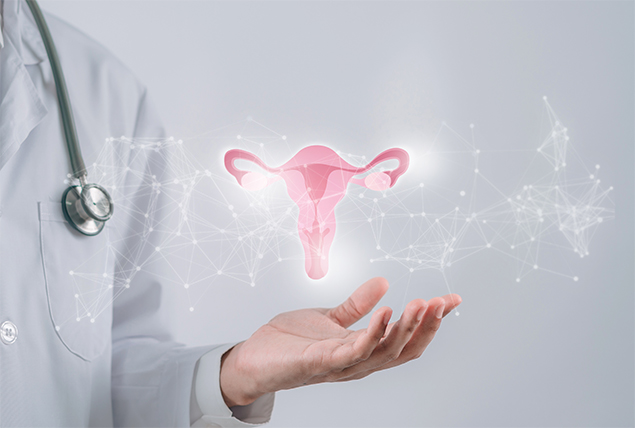What Is PCOS and How Can It Be Connected to Lupus?

Polycystic ovary syndrome (PCOS) is a relatively common condition. It affects 6 percent to 12 percent of American women of reproductive age.
That means PCOS affects as many as 5 million women in the United States, according to the Centers for Disease Control and Prevention (CDC). The condition affects how a woman's ovaries work.
What is polycystic ovary syndrome?
"PCOS occurs during women's reproductive years and is a problem with hormones," explained Monte Swarup, M.D., a board-certified OB-GYN with Women's Health Arizona in the Phoenix area and the founder of Vaginal Health Hub, an online community dedicated to women's health.
You must have two of these three primary symptoms to be diagnosed with PCOS:
- Irregular periods (ovaries that do not regularly ovulate, or release eggs)
- High levels of male hormones in your body (can cause excess facial or body hair or acne)
- Polycystic ovaries (ovaries that become bigger than normal and contain many fluid-filled sacs, or follicles, that surround the eggs)
PCOS often begins soon after someone's first menstrual period, but it can also develop later, in a person's 20s or 30s. Many women don't realize they have PCOS until they have difficulty getting pregnant.
Some women don't have any symptoms, whereas others are strongly affected by symptoms.
What are the symptoms of PCOS?
Swarup discussed the symptoms of PCOS as follows:
- Irregular periods that may be absent, happen infrequently, are too frequent or heavy, or are unpredictable
- Infertility
- Obesity
- Excessive hair growth on the chest, face, upper thighs and abdomen (aka hirsutism)
- Acne (more severe than usual and occurs after adolescence but doesn't respond to treatment)
- Oily skin
- Patches of dark skin called acanthosis nigricans
- Small fluid-filled cysts on the ovaries
The exact cause of PCOS is unknown, but elevated typically male hormones (androgens) are thought to play an important part. Risk factors for the condition include the following:
- Family history. If you have a mom or a sister with PCOS or type 2 diabetes mellitus (T2DM), you have a higher risk of developing PCOS.
- Weight. There is an association between PCOS and weight, but it still isn't understood. It's largely unknown if excess weight is a cause of PCOS, or if PCOS is a cause of excess weight gain.
- Insulin resistance. PCOS is related to higher levels of certain hormones in the body, including insulin, which controls sugar levels in the body. Many women with PCOS have insulin resistance and produce higher insulin levels to overcome this, which, in turn, can increase testosterone production.
How does PCOS affect women's lives?
PCOS could affect women's lives in many ways, especially when it comes to fertility, according to Swarup.
"The follicles do not release eggs regularly with PCOS," he said. "Therefore, women have issues with having 'normal' periods."
In addition to period complications, PCOS can cause problems with fertility, acne, excessive hair and weight gain, all of which can make life difficult. Swarup advised that symptoms are often more severe in women with obesity.
Women with PCOS have a higher risk of developing other chronic health problems, such as T2DM and high cholesterol levels.
What is PCOS treatment?
Treatments for PCOS include lifestyle changes and medication, Swarup said.
"They are focused on managing specific issues affecting you, including infertility, acne, hirsutism and obesity," he explained.
Swarup said the main treatment options for PCOS include the following:
- Lifestyle changes. Weight loss from diet and exercise is recommended. Weight loss can improve the effectiveness of medication and help with infertility.
- Medications. Birth control pills can help regulate your menstrual cycle as well as regulate estrogen, which can reduce the risk of endometrial cancer and can help with symptoms.
- Progestin therapy. This can help regulate the menstrual cycle and reduce the risk of endometrial cancer.
Other medications that can help with specific symptoms include the following:
- Fertility medicines. Clomifene citrate or injections of gonadotropins can encourage your ovaries to ovulate monthly.
- Metformin. Usually used to treat T2DM, metformin can help regulate blood sugar levels, stimulate ovulation, regulate periods and lower the risk of miscarriage.
- Co-cyprindiol. This can be used to treat acne and extra hair growth.
- Anti-androgen medications. Excessive hair growth can be controlled with these drugs.
For some women who don't respond to fertility medication, a minor surgical procedure called laparoscopic ovarian drilling (LOD) may be a treatment option. During this procedure, the ovaries are surgically treated using heat or a laser to destroy the tissue that's producing the male hormones. It might help rebalance your hormones and restore the normal function of your ovaries.
If you have problems with fertility, assisted reproductive technology (ART) such as in vitro fertilization (IVF) might help with your family-building plans.
Every woman experiences different symptoms of PCOS, so your treatment plan will be unique to you and your symptoms.
What is the link between PCOS and lupus?
In terms of the PCOS-lupus link, this specifically refers to systemic lupus erythematosus (SLE), the most common form of lupus. We'll refer to it as lupus.
Lupus is an autoimmune disease in which the immune system attacks its own body tissues and organs. It's a chronic condition with no cure that can affect the joints, skin, brain, lungs, kidneys and blood vessels.
The Lupus Foundation of America estimates that 1.5 million Americans have lupus. Symptoms can range from mild to life-threatening and include the following:
- A butterfly-shaped rash on the cheeks and nose
- Extreme fatigue
- Joint pain and swelling
- Swelling in the hands, feet or around the eyes
- Headaches
- Low fevers
- Sun sensitivity
- Chest pain when breathing deeply
- Hair loss
- Oral ulcers
- Raynaud's disease
- Lung, heart or kidney problems
- Seizures
- Psychosis
- Blood cell and immunological abnormalities
Antibodies are proteins that help protect your body from invaders such as bacteria, fungi, viruses and toxins. In comparison, autoantibodies react to antigens, and instead of fighting them off, they can launch an abnormal immune response that attacks the cells, tissues and organs of your body.
This can lead to autoimmune diseases such as lupus. Some scientists think PCOS could be an autoimmune disorder.
"There is a link between PCOS and autoimmune disorders, including anti-nuclear antibody (ANA) and anti-thyroid peroxidase (anti-TPO)," Swarup explained. "These have been documented in Hashimoto and lupus erythematosus."
Autoantibodies might affect the long-term clinical management of these patients, he added.
ANA and anti-TPO are autoantibodies. A doctor might test for these if they suspect you have an autoimmune disorder. However, some people have positive ANA tests even when they're healthy.
Many people with PCOS show autoantibodies in their blood tests, such as ANA, which can also be found in people with autoimmune disorders such as lupus, Hashimoto thyroiditis or Sjogren's syndrome.
The PCOS Nutrition Center advises that Hashimoto's thyroiditis has been reported in 18 percent to 40 percent of women with PCOS, making it three times more common in this population.
A 2021 research study published in the journal Clinical Rheumatology found that the prevalence of rheumatoid arthritis, systemic sclerosis and connective tissue disease were all significantly more frequent in patients with PCOS, compared to those without it.
Several other studies have highlighted that autoimmune disorders and elevated levels of autoimmune antibodies are more common among PCOS patients.
Essentially, Swarup said there are similarities between PCOS and other autoimmune diseases, such as lupus.
"However, being diagnosed with PCOS does not mean you will have autoimmune disease issues, although research shows it increases the likelihood," he added.
Are the treatments for PCOS and lupus similar or different?
Treatment of PCOS has been covered, but if there is a link to autoimmune conditions, how does this treatment compare to that of lupus or other autoimmune disorders?
"Treatments cannot cure an autoimmune disease. They aim to reduce inflammation and pain and control the immune response," Swarup explained.
According to Swarup, common medications used to treat lupus include the following:
- Nonsteroidal anti-inflammatory drugs (NSAIDs) such as ibuprofen and naproxen
- Drugs for immune suppression
Treatments to help relieve fatigue, rashes, swelling and pain are available (such as hydroxychloroquine). Your doctor can prescribe steroid tablets, injections or creams for kidney inflammation and rashes.
However, lifestyle recommendations remain similar, such as eating a balanced diet and exercising regularly.
The treatment for PCOS and lupus differ, despite their autoimmune similarities, and depend on your individual symptoms.
How can you manage lupus and PCOS?
Having PCOS, lupus or any other chronic condition can be challenging. Having more than one can sometimes feel overwhelming. Four key lifestyle changes you can adopt to manage any chronic health condition are:
- Eat healthy and well-balanced meals.
- Get regular physical activity, but be careful not to overdo it.
- Get enough rest.
- Reduce stress levels.
Finding a specialist is key to managing multiple health conditions, Swarup explained.
"If you have an autoimmune disease, or have multiple health concerns, make certain to see your doctor and find a specialist who treats autoimmune disease or PCOS," he said. "There are over 80 autoimmune diseases that exist, and having overlapping symptoms can make them complicated to diagnose."
Don't have a doctor you see regularly, you should. Perhaps you've moved, your longtime physician retired or you just need a change. If you suspect PCOS or some other condition might be an issue, Giddy telehealth takes the difficulty out of searching for a new physician.
The easy-to-use online service provides access to hundreds of healthcare professionals who have expertise across the full scope of medical care. Many of them specialize in women's health and offer same-day video visits.


















